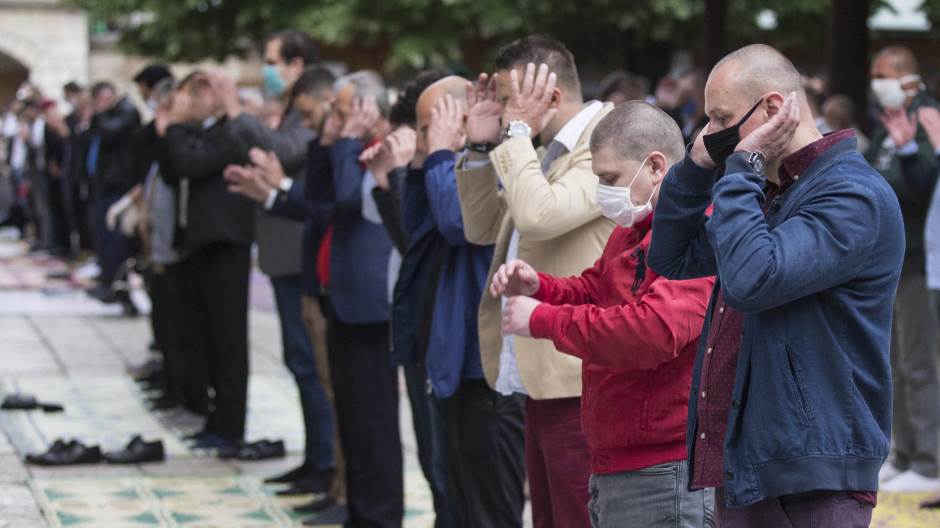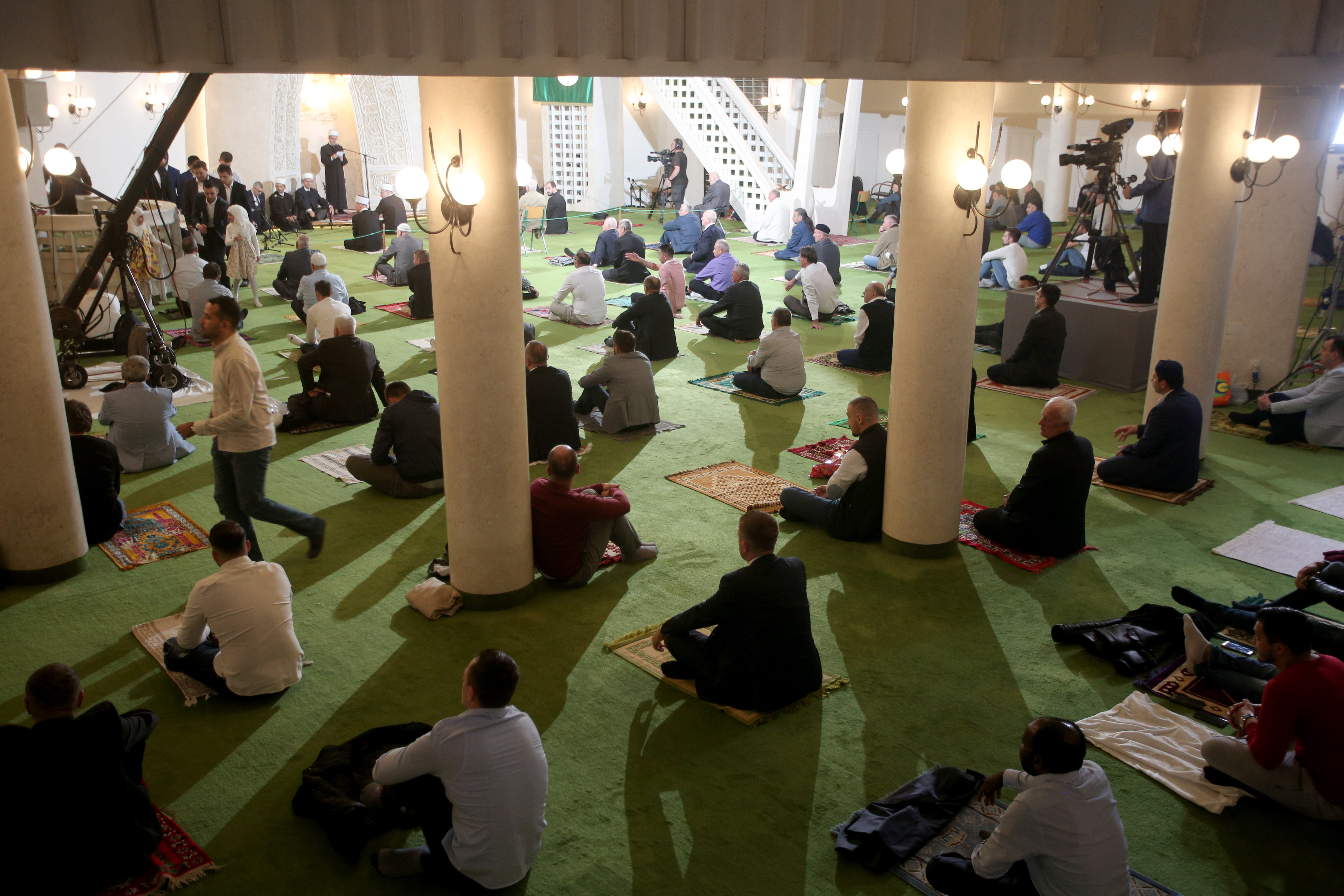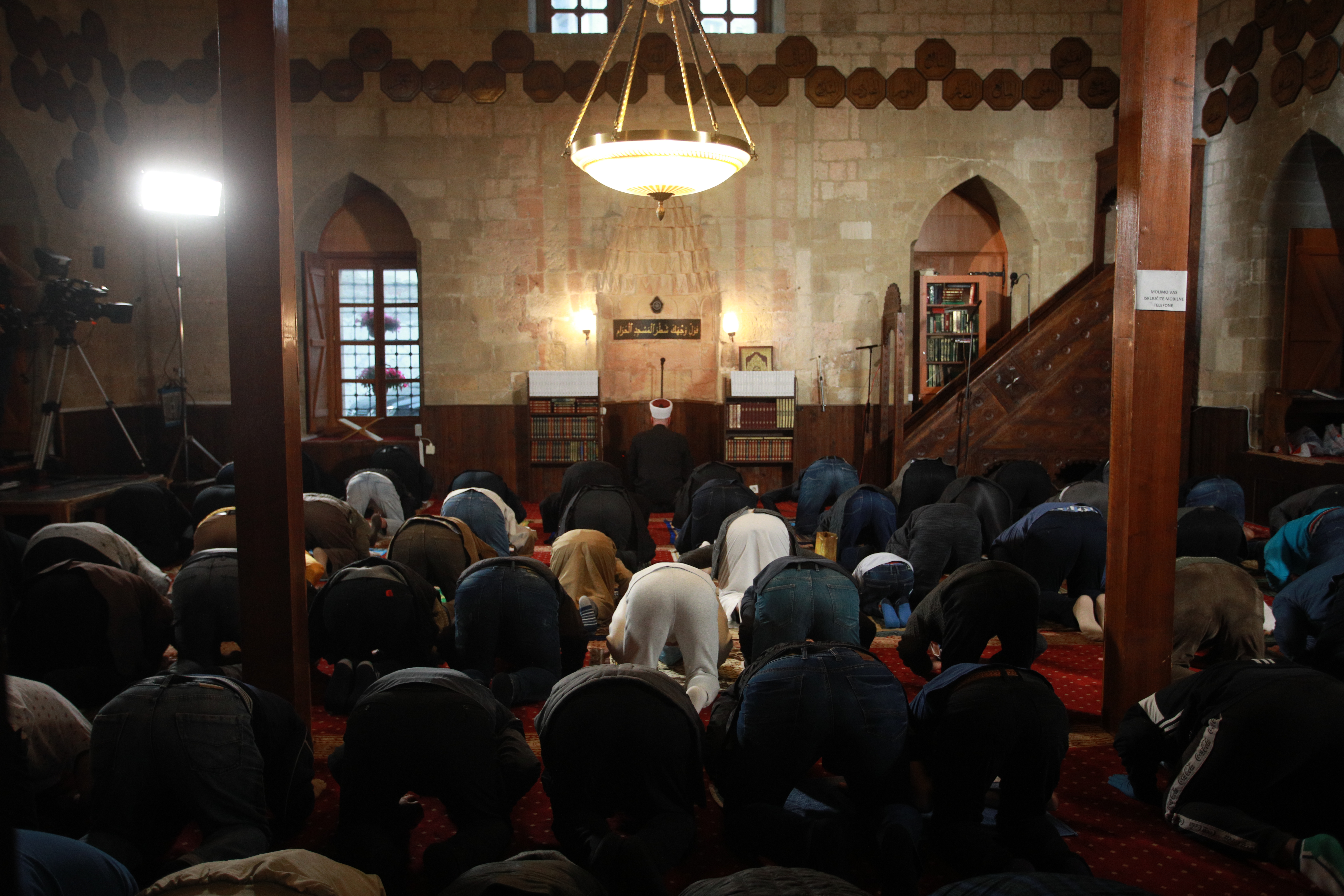
Wearing face masks and sitting unusually apart from each other, Muslims celebrated one of their most important holidays, Eid-al-Fitr - locally called Bayram - early on Sunday morning in mosques across the region.
The holiday marks the end of Ramadan, the month of fasting which Muslims around the world spend abstaining from food, drink and intimate intercourse from dawn to sunset. Ramadan is known by feasts with family and friends after sundown but this year the coronavirus prevented such gatherings and kept the faithful away from mosques.
Only a limited number of believers were allowed to attend the early morning prayers, provided they sit far away from each other.
Apart from protective masks, some were wearing gloves and many brought their own praying carpets from home.
The central prayer of the Islamic Community in Bosnia was held at Sarajevo’s Gazi Husrev-beg's Mosque, where the head of the Islamic Community sent his message of peace to believers throughout the region.
Several hundred believers prayed in the Zagreb mosque in compliance with the epidemiological measures prescribed for the coronavirus pandemic.

Because they had to keep the prescribed physical distance, except in the main hall, prayers were offered in other mosque rooms, in the hallway, as well as in part of the courtyard of the mosque.
In his sermon, mufti Aziz ef. Kavazovic commented on the current situation with the coronavirus, called on the faithful to remain vigilant, to avoid shaking hands and hugs when congratulating Bayram and to continue to follow the instructions and regulations of the Croatian Civil Protection Headquarters.
Muslims wearing masks and gloves also filled Belgrade’s Bajrakli mosque as much as the new rules allowed them, which means that some had to pray in the courtyard.

"I believe we have all deeply felt what it means to have someone, to have an interlocutor, what it means to be able to speak a word to someone, and I believe we have felt the bitterness of loneliness and learned that it is true that other people are one of the greatest gifts God has given to a person. So let’s protect each other," the head of the Islamic Community in Serbia, Sead Nasufovic, said.
Muslims in Montenegro also prayed under special measures this morning. The number of believers in mosques was limited, while no more than 20 people were allowed in the courtyards. During the prayer, it was obligatory to keep a social distance, while some believers brought their own prayer carpets.
In the Ferhat Pasha mosque in the Bosnian city of Banja Luka, the faithful prayed this morning along with their Mufti, Nusret Abdibegovic, who in his address to the media after the prayer noted that the many good wishes and congratulations he received came from officials from all levels of government which shows some “positive vibrations and movements in Banja Luka.”
During the 1992-95 war, Muslims were expelled from the city and all of their 16 mosques were blown up. Most of them have been reconstructed later and many of those who were expelled returned to their pre-war homes.
Eid has its religious dimension, but it also has its social and cultural dimension, the Mufti said.
“Ultimately, a big event is always an opportunity for people to meet, to exchange experiences, to congratulate each other and wish each other well, which opens up communication,” he said.
He argued that sorrow can be endured alone, “but joy must be shared, it spreads like concentric circles and it overwhelms our space, overwhelms people and this day is the day we are sharing our joy,” he said.
Abdibegovic mentioned those who live abroad and usually visit their city and their families for the holidays but this year they too had to stay home.
"It feels empty without them, I know that they are sad they could not come, and we regret they did not come. We believe that Allah will send His mercy and we have prayed today for Allah to protect all of us, all people, nations from all sudden phenomena, whether earthquakes, pandemics, floods or storms,” he said, expressing hope that those who could not visit will maybe do so in the summer.
In the eastern Bosnian town of Foca, believers also prayed in newly reconstructed mosques, such as the Aladza, one of the most beautiful in Bosnia and Herzegovina, but also in the Balkans.
For several years now, Almin Karovic has been celebrating Bayram in Foca, where he lived before the war.
“This area around the Aladza mosque is the place where I grew up and lived in my youth,” he said.
He said that he is reminded of old times and stories the elderly used to tell about the Aladza now that the mosque has been renovated.
“I somehow analyze it and get a complete picture of the significance of the Aladza mosque and what it meant for Foca," said Karovic.
The prayer was led by imam Dzenan ef. Krajisnik, who said this Ramadan there could be no large, joint feasts, called iftars, but that the mosque delivered the food to believers at home.
"We will all remember this Ramadan and this Bayram well. They were really a little different from all the previous ones,” he said, adding that believers should not remember them by diseases, borders, dangers, but by the time they got to spend with their families.
“The times we have dedicated to our spiritual, physical improvement, both ourselves and our community, our congregation. We will remember them by the grace of the time that awakened in us a feeling for others, for the neighbourhood, for the elderly and for the weak,” he said.
More than 1,000 evening meals were prepared during Ramadan and people have planted more vegetables in their fields this year than ever before.
"So life is slowly coming back,” said the chairman of the municipal assembly, Izet Spahic.
After the Bayram prayers, the faithful congratulate each other and visit relatives, neighbours and friends. Families gather around a rich food table while children are given candy and money.
Kakvo je tvoje mišljenje o ovome?
Učestvuj u diskusiji ili pročitaj komentare





 Srbija
Srbija
 Hrvatska
Hrvatska
 Slovenija
Slovenija







